GOLD Please Please Me OWNED by Neil Aspinall The Beatles Vinyl Record & NEMS Bag
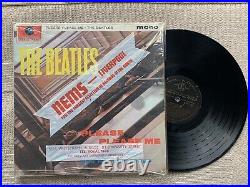
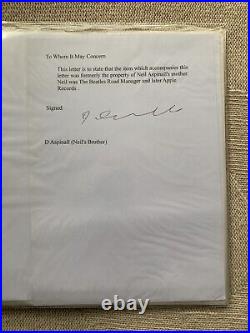
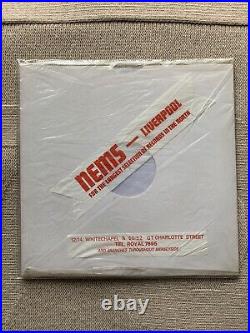
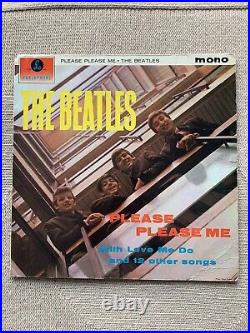
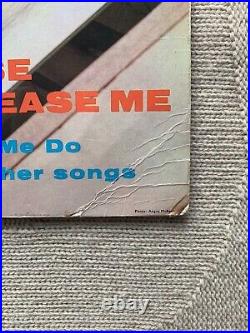
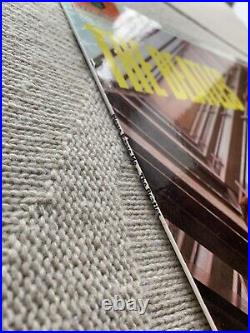
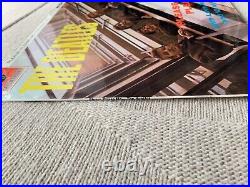
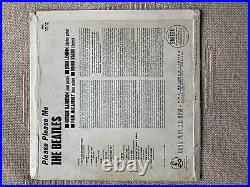
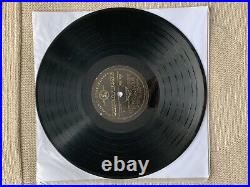
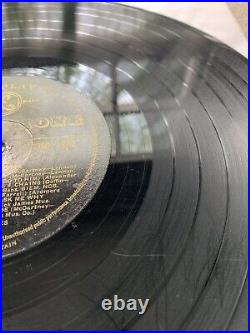
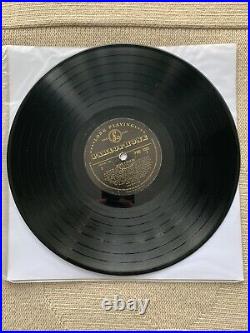
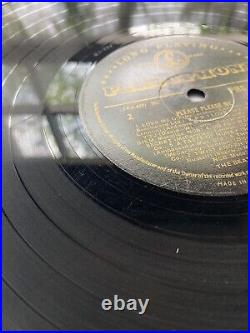
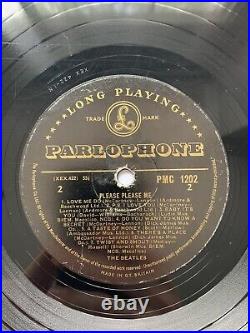
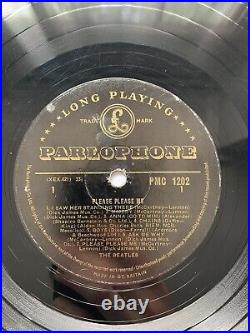

GOLD Please Please Me OWNED by Neil Aspinall The Beatles 1 of 1 Vinyl Record. Neil Aspinall was The Beatles' road manager, friend and then CEO of Apple Corps. That really is the full story to it.
The vinyl has seen better days, and has one skip during Love Me Do. I have not cleaned this with a professional machine, so it might be possible to'buff' this out with a deep clean.
The record does have surface noise throughout, but to those that have heard this pressing of this record, you know it is UNBELIEVABLE SOUNDING! Correct cover with credit to Angus McBean in far right.See image for an actuate description of cover and label condition. The NEMS bag has sadly split, but still holds the integrity you'd expect from a 70 year old plastic bag.
NEMS was of course The Beatles' manager, Brian Epstein's record shop in Liverpool. The Beatles played at the opening of the Casbah Coffee Club. On 29 August 1959, which was in the cellar of Mona Best. Aspinall later rented a room in the house and became very good friends with then-Beatle Pete Best. The Beatles had previously used public transport to travel to local bookings, however by February 1961, they were playing two or three shows per night at different locations needing their own transportation.
Best asked Aspinall to be a part-time road manager. (60d [old pence] 25p [new post 1971 pence]) per concert. Harrison later said: Our early van became the centre of attention every time it pulled up.It was brush-painted red and grey and from head to foot was covered in graffiti - girls' names, and things like'I love you, John'. It looked interesting, but the moment anybody saw it they would feel free to write all over it. The Beatles were driven down to London by Aspinall on New Year's Eve in 1962, for their Decca audition.
But Aspinall lost his way, and the trip took ten hours. They arrived at 10 o'clock at night, and John Lennon said that they arrived just in time to see the drunks jumping in the Trafalgar Square.
In 1963, Aspinall was joined by Mal Evans. Best was sacked from the Beatles on 16 August 1962, by manager Brian Epstein. Acting on behalf of Lennon, McCartney and Harrison. Accounts vary of Aspinall during this event. According to MerseyBeat editor Bill Harry. Aspinall was waiting downstairs in Epstein's NEMS.Record shop, and was the first one to talk to the by then ex-Beatle in the Grapes pub, across from the Cavern. Aspinall was furious and said that he would stop working for the band as well, but Best strongly advised him not to. Aspinall asked McCartney and Lennon at the next concert why they had fired Best and was told, It's got nothing to do with you. You're only the driver.
However, in a 2007 interview, Aspinall provided Beatles historian Mark Lewisohn. With a distinctly different version of events, saying that he was physically present when Epstein sacked Best, that he told Best unprompted that he planned to continue working for the band, and that on his first subsequent encounter with the other band members, their first question to him was how Best had taken being sacked. Aspinall stayed with the band, ending his affair with Best's mother, a relationship that had led to the birth of baby Vincent "Roag" Best. Aspinall denied the story for years before publicly acknowledging that he was indeed Roag's father.
The Beatles had to travel in Aspinall's van along with their equipment, but British roads in the early 1960s were notoriously pot-holed. Ringo Starr remembered that the travelling never seemed to stop during the early tours of Britain in Aspinall's van, as they would be driven up and down Great Britain. With one of the group in the passenger seat, but with the other three on a hard bench seat in the back. Aspinall's job as personal assistant consisted of driving to concerts and meetings, but mostly meant just being there whenever someone needed something. Aspinall went on the first trip to the United States, and when George Harrison became ill with a fever and had a temperature of 102 °F (39 °C), he was ordered to stay in bed, so Aspinall stood in for him for The Ed Sullivan Show.However, Harrison was back in time for the final shooting. Before the cover of Sgt. Could be completed by Peter Blake. Aspinall was sent out to find photographs of all of the people that were to be shown on the front cover.
Aspinall suggested the idea of Sgt. Who would introduce the group, and the reprise of the title song near the end of the album. After recording sessions, Lennon, Harrison and Starr would be chauffeured back to their houses in the' stockbroker belt. But Aspinall would often drive McCartney and Evans in an Austin Princess. Limousine to a late-night club to eat. Nightclub was one of their favourites, at 8 Kingly Street. London, as it also presented live music. They would eat steak, chips and mushy peas.But Aspinall would always take out a torch. From his pocket (in the dimly lit club) to inspect the portions on each of their plates. This was to make sure that the portions were exactly as they had ordered, which McCartney always found amusing.
Although Harrison, McCartney and Starr had passed their driving tests, Lennon didn't pass his driving test until 1965; however, he rarely drove himself due to being a notoriously bad driver by poorly navigating roads and failing to notice other traffic, and as a result, he was usually chauffeured to and from recording sessions and appointments by his own personal chauffeur. Although not a musician, Aspinall made minor contributions to a handful of the Beatles' recordings. On Within You Without You. ", harmonica on " Being for the Benefit of Mr.", some percussion on " Magical Mystery Tour. ", and was among the many participants singing on the chorus of " Yellow Submarine.
Following the death of Epstein in August 1967, there was a vacuum in the management of the Beatles' affairs. The Beatles asked Aspinall to take over the management of Apple Corps in 1968, which had been founded in April of the same year. Aspinall later said that he only accepted the position after being asked, but did not want to do it full-time, and would only do it until they found somebody else. Was against the idea, as he thought that Aspinall did not have the necessary social qualifications to be able to speak to the upper class.
Aspinall accompanied McCartney and Lennon to New York on 11 May 1968, to announce the formation of Apple to the American Media. Apple Corps had five divisions: electronics, film, publishing, records and retailing. Aspinall later spoke of the Beatles' business arrangements. We did not have one single piece of paper. The lawyer, the accountants and Brian, whoever, had that. The Beatles had been given copies of various contracts, maybe, I don't know. I didn't know what the [recording] contract was with EMI, or with the film people or the publishers. So it was a case of building up a filing system, find out what was going on while we were trying to continue doing something. Said that Aspinall hated being stuck in the Apple office at 3 Savile Row. All through the recording of The White Album. Life in the Apple office, however, was improved by having a chef. This was mostly due to Aspinall's and Peter Brown's. Four-course lunches with expensive wines in the dining room at Apple. Was brought in to be the Beatles' manager Aspinall was dismissed, but reinstated after complaints from the group, and because Klein realised that Aspinall was no threat to his control of the company. Klein lost a High Court. Action in 1971 (started by McCartney) but lawsuits.Between Klein and Apple kept Aspinall busy until 1977. In 1978, Aspinall instigated the first of three lawsuits. On behalf of Apple Corps against Apple Computer, Inc. Now known as Apple, Inc.
As a condition of the settlement, Apple Computer was allowed to use its logo as long as it did not enter the music business. The second suit with Apple Computer arose in 1989, when Apple Corps sued Apple Computer over its Apple IIGS (which included a professional synthesiser chip) claiming violation of the 1981 settlement agreement. McCartney praised Aspinall for trademarking. The Apple name worldwide, and called Aspinall Mr.
X in the Apple Corps organisation. In September 2003, Apple Computer, Inc. Was again sued by Apple Corps, this time for the introduction of the iTunes Music Store. Which Aspinall and Apple Corps believed was a violation of the previous agreement for Apple Computer to not distribute music.
The trial began on 27 March 2006 in the UK, and ended on 8 May 2006 in a victory for Apple Computer; the judge ruled the company's iTunes. Aspinall was also involved in several court cases in which Apple Corps took action against EMI. We have tried to reach a settlement through good faith negotiations and regret that our efforts have been in vain. Despite very clear provisions in our contracts, EMI persist in ignoring their obligations and duty to account fairly and with transparency. The Beatles and Apple are, once again, left with no choice but to sue EMI.In the early 1990s, Aspinall became the executive producer for The Beatles Anthology. He, producer George Martin, and press officer Derek Taylor. Are the only non-Beatles seen in new footage for the documentary. He continued to advise the surviving Beatles, as well as Lennon's and Harrison's estates, and to supervise the marketing of music, music videos.
On 10 April 2007, it was announced by Apple that Aspinall had "decided to move on" and Jeff Jones. A longtime VP at Sony Legacy-was hired as CEO. One of Aspinall's final tasks at Apple was to oversee the remastering of The Beatles' back-catalogue for an anticipated 2008 release.This item is in the category "Music\Music Memorabilia\Artists/ Groups\The Beatles". The seller is "nottinghillbilly" and is located in this country: GB. This item can be shipped worldwide.
- Artists/Groups: The Beatles
